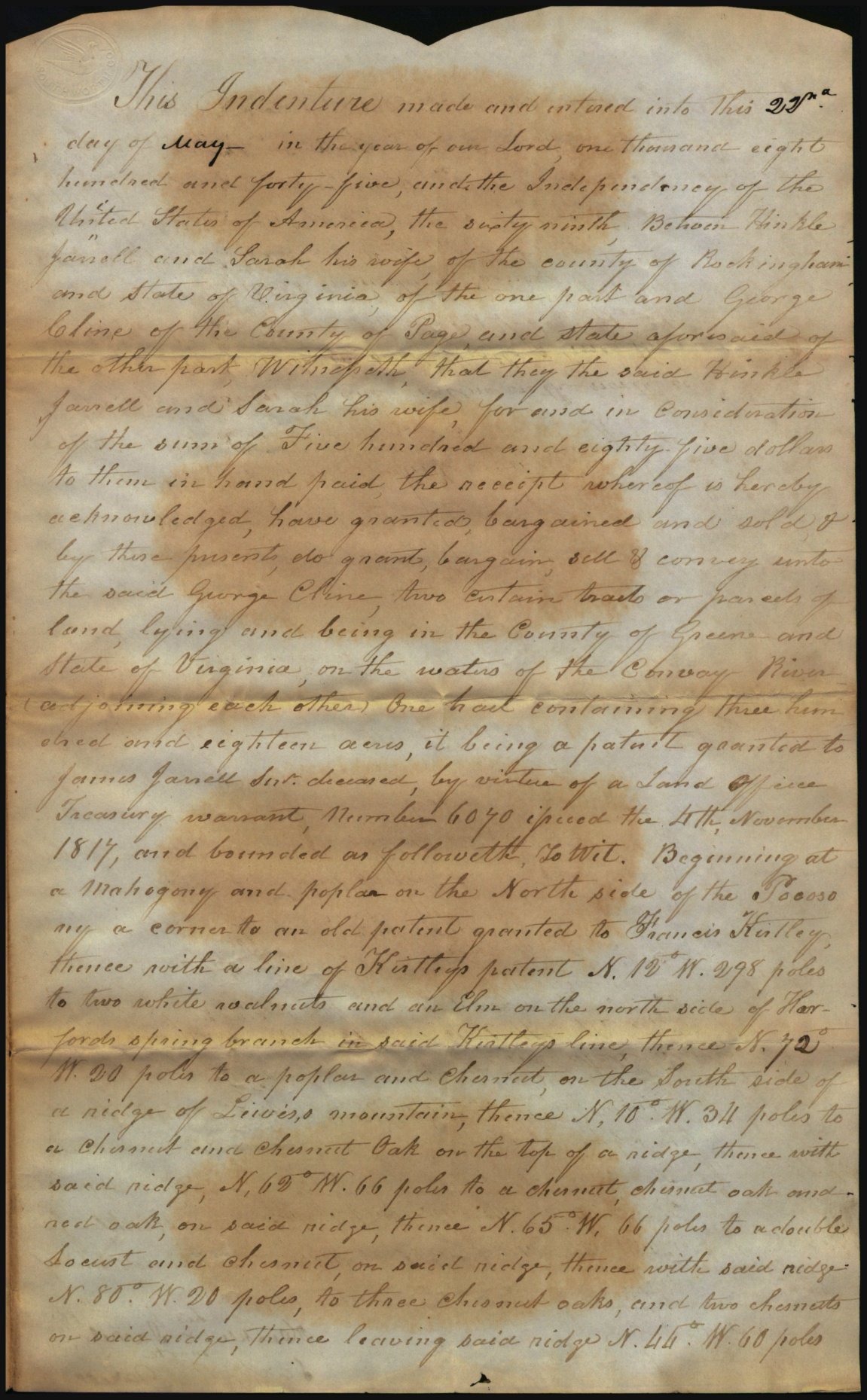This northern Shenandoah Valley county is named for John Page, Governor of Virginia from 1802-1805. Land from Rockingham and Shenandoah counties created the county in 1831. As addressed in a previous blog, bounty land warrants are a collection of records within the Library of Virginia’s chancery collections. Treasury warrants are another such collection found in Page County’s chancery causes. In order to extend the land patenting process, the General Assembly establishes the Virginia Land Office in 1779. The office begins to issue numbered treasury warrants for the state’s “waste and unappropriated” land.
Unlike bounty land warrants, no proof of military service is necessary to purchase land. Residency in Virginia is not a requirement. The initial purchase price is forty pounds for every one hundred acres. After payment is established, the treasurer issues a receipt for payment. Upon presenting a receipt to the state auditor, a newly created certificate indicates the amount of land to which a person is entitled. Upon presentation of the certificate, the register of the Land Office creates the treasury warrant. In doing so, the warrant authorizes any surveyor to lay off a person’s amount of land.
These warrants contain the following information: the name of the warrantee, amount of acreage, the warrant number, and the name of the county in which the granted land lies. Next, the county surveyor receives the warrant. Upon completion of the survey, the warrantee returns the survey, warrant, and any related papers to the Land Office. The Office allows six months to file any objections (caveats). Once the allotted time is up, the Office records the plat and certificate. The governor signs the grant and the Office records the grant. Finally, the grantee receives the original grant.
At any time during the grant process, the purchaser of the treasury warrant has the ability to sell (assign) the right to all or part of the land described in the warrant. Because of this ability, these warrants often became part of chancery causes involving contract, estate, or debt disputes. This was especially true in Page County from the 1830s to the post-Civil War period. What follows are examples and descriptions of such causes.
Note: Page County originally processed the chancery causes. As a result, a cause’s date refers to the beginning of the cause instead of the end of the cause.
Isaac Overall v. Widow of George Hetick, etc., 1832-001, calls into question the treasury warrant process. After the plaintiff files his warrant for 4,790 acres, the defendant files her warrant for 25,517 acres. The plaintiff’s land is contained within the defendant’s land—originally part of Shenandoah County (now Page). According to the deposition of the current county surveyor in 1833, a previous surveyor recorded the plaintiff’s plat and survey. This surveyor’s book is lost when the current surveyor’s home burns down. The defendant’s claim rests on the fact that her husband is a lifelong resident of Pennsylvania.
Admr of Samuel Coffman, etc. v. Pierson Judd, 1838-012, involves a contract dispute centering around the land grant of Robert Oliver of Baltimore, then deeded to Thomas Shirley of Madison County, involving 42,700 acres of land in the counties of Madison, Culpeper (now Rappahannock), and Shenandoah (now Page). The complainant cannot make a good title to land sold. The defendant hopes that the chancery court judge rescinds the contract. This cause contains five plats, a number of deeds, and numerous references to Land Treasury Warrants—Nos. 5650, 1401, 429, and 3023—and warrants from the Virginia Land Office—Nos. 1079-1096, 139-140, and 1161-1164.
In John Offenbacker & wife v. Andrew F. Grayson, trst, etc., 1845-002, plaintiffs confer 140 acres of land to Paul Offenbacker in a deed of trust. Another deed to this land, from plaintiffs to defendant, references Land Office Treasury Warrant No. 5944.
Henkle Jarrell (Hinkle Jarrel) v. George Cline, 1845-010, highlights a contract dispute over 318 acres in Greene County. As a deed between Hinkle Jarrel and wife and George Cline indicates, James Jarrell, Sr. receives Land Office Treasury Warrant No. 6070 on November 1817.
Admx of Reuben P. Bell, Sr., etc. v. Admr of John H. Keyser, etc., 1866-035, contains a plat and land grant (Land Office Treasury Warrant No. 5544) issued by Governor Thomas M. Randolph to George Kizer for a 400-acre mountain tract on 22 December 1815.
Additional topics of interest have appeared in the Page County Chancery finding aid during the reprocessing—from large endeavors made possible by the forced labor of enslaved individuals to the challenging of the county’s norms by both free and enslaved individuals.
Additional resources regarding the Virginia Land Office include items on LVA’s Research Guides and Indexes page (under Land Patents and Grants).
The processing and scanning of the Page County chancery causes, 1813-1914 (bulk 1831-1914), was made possible by funding from the innovative Circuit Court Records Preservation Program (CCRP), a cooperative program between the Library of Virginia and the Virginia Court Clerks Association (VCCA), which seeks to preserve the historic records found in Virginia’s Circuit Courts.
Image Citations
Page County (Va.), Chancery causes, 1832-001, Isaac Overall v. Widow of George Hetick, etc. Local Government Records Collection, Library of Virginia.
Page County (Va.), Chancery causes, 1838-012, Admr of Samuel Coffman, etc. v. Pierson Judd. Local Government Records Collection, Library of Virginia.
Page County (Va.), Chancery causes, 1845-002, John Offenbacker & wife v. Andrew F. Grayson, trst, etc. Local Government Records Collection, Library of Virginia.
Page County (Va.), Chancery causes, 1845-010, Henkle Jarrell (Hinkle Jarrel) v. George Cline. Local Government Records Collection, Library of Virginia.
Page County (Va.), Chancery causes, 1866-035, Admx of Reuben P. Bell, Sr., etc. v. Admr of John H. Keyser, etc. Local Government Records Collection, Library of Virginia.
Header Image:
Page County (Va.), Chancery causes, 1845-010, Henkle Jarrell (Hinkle Jarrel) v. George Cline. Local Government Records Collection, Library of Virginia. (Image 12)





















